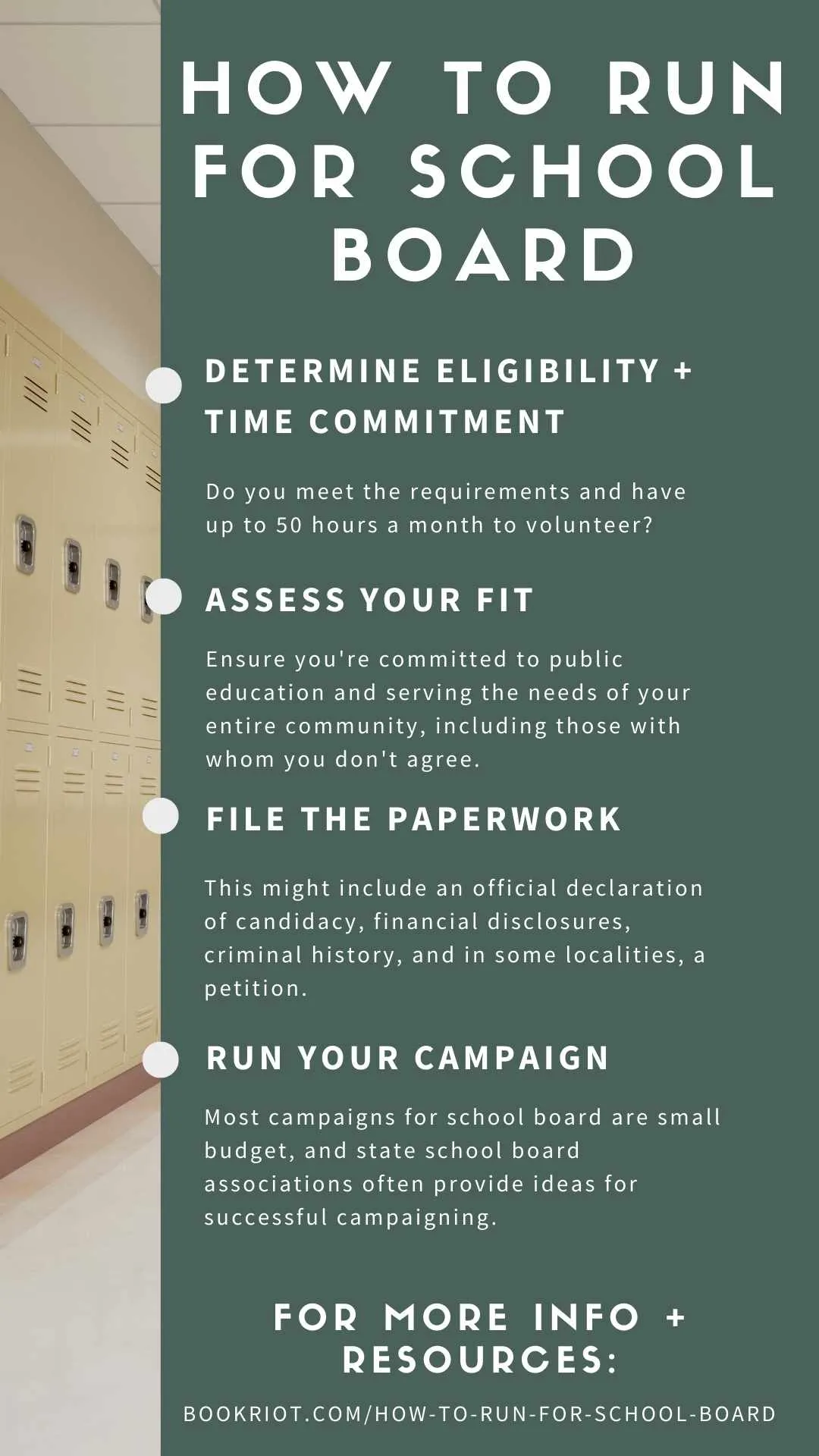
How to Run for School Board: Book Censorship News, September 9, 2022
Curious what it looks like to run for school board? Wondering if now is your time to step up and help provide governance for your local education system? Let’s dive in.
It’s no secret that school board elections right now are crucial. It’s also no secret that some school board candidates — even in nonpartisan elections — are being funded by right-wing political action committees to infuse the board with specific conservative agendas. Groups like Moms For Liberty run trainings across the country, hoping to get their agenda on the local level to further remove the voices of any non-white, non-straight, non-Christians from schools (and to help accelerate the process of destroying public school funding more broadly). While certainly these groups have money and people behind them, they do not speak on behalf of an entire community, and it is crucial that those with talent, passion, and an interest in serving all of a community, rather than a cherry-picked portion of it, put their name into the hat of serving on the local school board.
The following is applicable to most school boards in the US, but because no information is uniform across the country, spend a little time ensuring you know the steps and process for your municipality. Each state has an association of school boards, and those websites will be flush with updated information and insight into the rules specific to your location.
How To Run for School Board
Determining Eligibility and Time Commitment
- Familiarize yourself with what school boards do. It might sound silly to say that, but it is vital to know what you may or may not be able to do with a role on the board.
- Know when your next school board election is and how many seats will be up for election. Research the candidates in those seats currently to determine if you want to run against them or wait to run until another candidate’s seat is available. In some cases, you may see an open seat you want to run for, but your residency does not meet the boundaries of that seat. Some are district wide “at large,” meaning you represent the entire district and some come from specific limits within a community, meaning you’d represent a specific part of a community. (Note: you can access some school board information for eight states in the US with our School Board Project Part 1 and Part 2).
- Make sure you are eligible to run. Every state is different, but in general, you must be 18, have no felony convictions, are not employed by the district for which you’re running, and you live in the district. Some states have educational requirements as well.
- Prepare to volunteer — most school board positions are unpaid. School boards are, by design, inequitable and thus, those without financial strains have more ability to serve.
- Know that you’ll spend 15-20 hours a month, if not more, doing school board related work. Some state school board associations clock that time much higher. School boards are, by design, inequitable and thus, those without work, family, or extracurricular strains have more ability to serve.
Qualities of Good School Board Candidates
Do some background reading into school boards and how they operate. This survey by the National School Boards Association, conducted in 2018, offers a broad look at the state of school boards. It is obviously different now, but the groundwork there is good for giving you insight into what makes a good candidate.
- A strong commitment to the value, purpose, and goals of public education
- Desire to ensure all students within a school are served as equitably as possible
- Clear communication, desire to be transparent, and interest in hearing from all constituents within your area of representation
- A sense of justice, fairness, and willingness to consider all sides of an issue before speaking or voting
- Interest in leading, not managing, the district in its mission
Filing Paperwork to Declare Candidacy
Each and every state will be slightly different, and things might differ on a county-by-county basis. Check with your county elections clerk to ensure you file all appropriate paperwork on time.
Among the most common paperwork:
- Official declaration of candidacy (which may include a filing fee)
- Financial disclosures (to ensure you’re following campaign financing rules and avoiding conflicts of interest)
- Criminal history
- Nomination petitions
Running a Campaign
It is tricky to offer a play by play here because it differs by community. In some places, it’s still the case where getting candidates to run for school board is a challenge so you may be running uncontested. According to data from 2018 — which, we know this is a different time just a few years later — 75% of those who ran for school board spent $1000 or less. There is no question that in some areas, particularly where well-funded PACs and “parental rights” groups are pouring money into campaigns and candidates, it might cost a lot more.
Know what campaign finance requirements are in your state. Many of these bigger organizations get around having to talk about how they are funding candidates because of their status as a non-profit — and not all of these organizations have yet to file 990s which would open up some information about that.
Your state school board association will provide information as well. A few state specific samples:
- Get on board, Michigan
- 4 Tips for Running a Smart School Board Campaign (Texas School Board Association)
- Becoming a School Board Member from Minnesota School Board Association
The effort takes time and sometimes money. Get your name out there in person and online, and show you live the values you will bring to the board, including equity, care and commitment to the education of all students, and your belief in the power of public education. Take part in local candidate forums and be a staple at board meetings, even if you don’t speak.
It’s a lot of work, but it is yet another way to make a real impact on the lives of young people (and those who work with them or care about them). The more people who care about everyone in a community and desire to meet as many needs as possible through expanding education, rather than constricting it, the better the system flourishes and does precisely what it is meant to do.

Book Censorship News: September 9, 2022
- Red, White and Royal Blue by Casey McQuiston, Anatomy of a Boyfriend and Anatomy of a Single Girl by Daria Snadowsky, Red Hood by Elana K. Arnold, and Boy Toy by Barry Lyga are all being banned from Spotsylvania High School libraries (VA). You may recall Spotsylvania as home to Kirk Twigg, board president, who would like to see banned books burned.
- Virginia lawmakers want to put parental advisory labels on books in libraries.
- The Huntsville Public Library (TX) shut down because the city manager said they needed to stop having book displays. The head librarian is apparently still not back at work, and of course, this started over a Pride display.
- After Pride themed books were donated to Rocky Point schools (NY), the board put an end to book donations; the issue is still coming up at board meetings. The reasoning behind ending the donations doesn’t make sense.
- The Belton Independent School District (NY) highlights how they’re making student library records accessible for parents while dealing with seven book challenges right now.
- In Waukesha, Wisconsin, there is a … frighteningly impressive spreadsheet of books being reviewed because of parental complaints across the district.
- Four books in Osceola County Schools (FL) were pulled for review. The review board decided to keep them on shelves, but that item mysteriously disappeared from the school board meeting agenda.
- Bonny Eagle School District (ME) will not ban It’s Perfectly Normal. Gender Queer will be discussed in the next school board meeting.
- “A Lafayette-based group whose members believe that some books in the Livingston Parish Library system are too sexually explicit for younger readers told a judge Wednesday that it will file court papers claiming that a defamation lawsuit filed against it by a public school librarian is restricting its right to speak freely.” Free speech doesn’t mean freedom from consequences.
- City Councilor Jim Gray, who wanted to ban several LGBTQ+ books from a library in New Hampshire, did not look good when he made the proposal and certainly doesn’t look better now that the books will NOT be removed.
- It’d be great if newspapers would stop platforming groups like this, but here’s a look behind the scenes of Protect Nebraska Children, a group dedicated to preserving straight, white Christian conservatism throughout the state. They are indeed responsible for a number of book bannings throughout the state.
- A slightly unhinged editorial in a Warwick, New York, newspaper about porn in the library. I’m sharing this because these dis/misinformation efforts — especially unchecked by the media — are how these book banning movements get people riled up.
- Another unhinged editorial, this time from someone who is apparently a staff writer, about pornography in libraries. This time it’s Clark County schools in Nevada. The best line (sarcasm) in this one is about how no middle schooler needs to learn about bisexuality.
- More free newspaper publicity for hate groups trying to destroy public education. This time in Bucks County, Pennsylvania.
- Moms who are furious about educational gag orders in Oklahoma and the impact they’re having on teachers (including the Norman Public School teacher fired for sharing a QR code to Brooklyn Public Library’s banned books material) have stepped up to fight back. How? Giant QR codes.
- Edmond and Bristow Public Schools in Oklahoma deny banning books, even though they admit to banning books. Removing books “for review” is banning, and then voting to keep them removed…is also banning.
- Let’s Talk About It was removed from Abilene Public Library (TX).
- “Before the meeting ended, during another public comment period, John Lowe of Tuckaleechee Chapel spoke on behalf of pastors of 30 Blount County churches who have joined together as Awake 21 and are praying for the board to have ‘godly wisdom.'” This is in Blount County Schools (TN).
- Every library book and every classroom book in Broward County, Florida, schools, will be cataloged for parents to peruse. This is such a waste of time and resources (that is the point) particularly when so few parents are opting their students out of book access. Also, what kind of parents have time to go through catalogs for fun?
Further Reading
- Maia Kobabe talks about eir relief after a judge tosses obscenity lawsuit against Gender Queer.
- National Geographic has a nice history of book banning in America.
- Operation Caged Bird Seeks to Unban Books from Naval Academy: Book Censorship News, April 25, 2025
- It’s Still Censorship, Even If It’s Not a Book Ban: Book Censorship News, August 30, 2024
- Are You Registered to Vote?: Book Censorship News, August 23, 2024
- What Is Weeding and When Is It Not Actually Weeding?: Book Censorship News, August 16, 2024
- How To Explain Book Bans to Those Who Want To Understand: Book Censorship News, August
- A New Era for Banned Books Week: Book Censorship News, August 2, 2024
- The Ongoing Censorship of High School Advanced Placement Courses: Book Censorship News, July 26, 2024
- The Quiet Censorship of Pride 2024: Book Censorship News, July 19, 2024
- Survey: What Happened During Pride Month? Book Censorship News for July 5, 2024
- The First American Union Understood The Necessity of Public Libraries and Education: Book Censorship News for June 28, 2024









